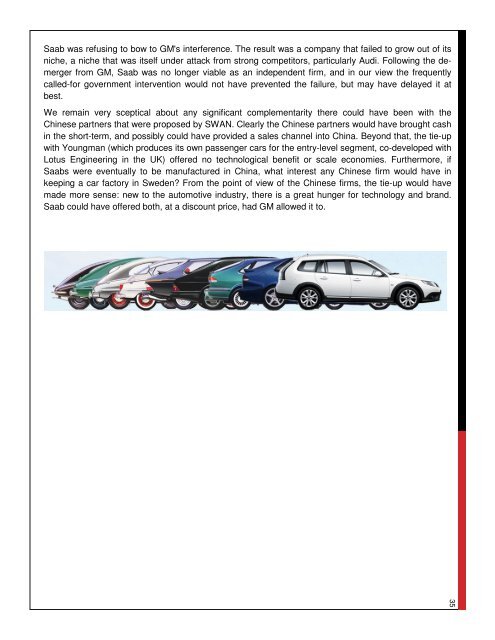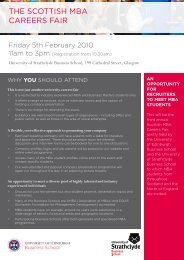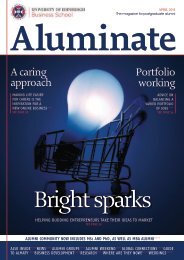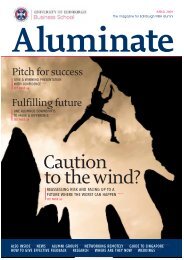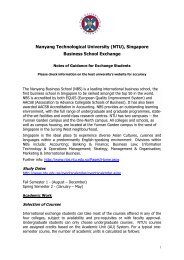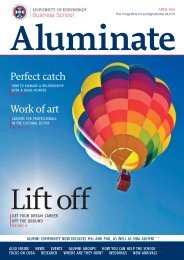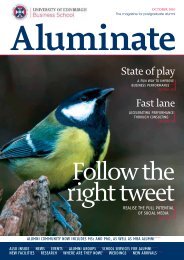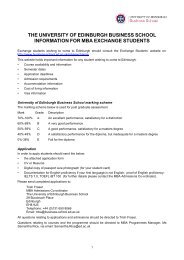<strong>Saab</strong> was refusing to bow to GM's interference. The result was a company that failed to grow out <strong>of</strong> its niche, a niche that was itself under attack from strong competitors, particularly Audi. Following the demerger from GM, <strong>Saab</strong> was no longer viable as an independent firm, and in our view the frequently called-for government intervention would not have prevented the failure, but may have delayed it at best. We remain very sceptical about any significant complementarity there could have been with the Chinese partners that were proposed by SWAN. Clearly the Chinese partners would have brought cash in the short-term, and possibly could have provided a sales channel into China. Beyond that, the tie-up with Youngman (which produces its own passenger cars for the entry-level segment, co-developed with Lotus Engineering in the UK) <strong>of</strong>fered no technological benefit or scale economies. Furthermore, if <strong>Saab</strong>s were eventually to be manufactured in China, what interest any Chinese firm would have in keeping a car factory in Sweden? From the point <strong>of</strong> view <strong>of</strong> the Chinese firms, the tie-up would have made more sense: new to the automotive industry, there is a great hunger for technology and brand. <strong>Saab</strong> could have <strong>of</strong>fered both, at a discount price, had GM allowed it to. 35
ACKNOWLEDGEMENTS lxxxv This report is partly based on a research collaboration between Chalmers <strong>University</strong> <strong>of</strong> Technology and the <strong>University</strong> <strong>of</strong> Cambridge. In particular we would like to thank Patrik Jonsson, Mats Johansson, and Dan Andersson for their support. A special thanks goes to Christian Finnsgård for his comments and kind support with tracking the Swedish court proceedings and media. BIBLIOGRAPHY Bayley, S. (1986) 'Marketing Vorsprung durch Technik'. In S. Bayley, Sex, Drink and Fast Cars: The Creation and Consumption <strong>of</strong> Images, Chapter 7, pp. 87-112. Chatterton, M. (1980) SAAB: The Innovator. Newton Abbot: David and Charles Fisher, A.B. (1985) 'Courting the well-heeled car shopper', Fortune Magazine, 5 August. Holweg, M. and Pil, F. (2004), ‘The Second Century: Moving beyond Mass and Lean Production in the Auto Industry’, Cambridge, MA and London, UK: MIT Press Holweg, M., Davis, P., and Podpolny, D. (2009) ‘The Competitive Status <strong>of</strong> the UK Automotive Industry’, a report to the New Automotive Innovation and Growth Team, Department <strong>of</strong> <strong>Business</strong> Innovation and Skills. Published by PICSIE Books, Buckingham. Holweg, M. and Pil, F.K. (2009) 'A break from the past: Volvo and its malcontents.' In: Freyssenet, M. (ed.) The second automobile revolution: trajectories <strong>of</strong> the world carmakers in the XXI century. Houndmills: Palgrave Macmillan, pp.353‐365 Nuttall, W.J., Holweg, M. and Leybovich, M. (2011) 'Too big to fail — Lessons for today and the future from British industrial policy, 1960–1990', Technological Forecasting and Social Change, In Press. doi:10.1016/j.techfore.2010.11.003 Ingrassia, P. (2011) Crash Course. New York: Random House. Muniz Jr., A.M.; O'Guinn, T.C. (2001) 'Brand community', Journal <strong>of</strong> Consumer Research, Vol. 27, No. 4, pp.412-432 Oliver, N., Schab, L. and Holweg, M. (2007) ‘Lean principles and premium brands: conflict or complement?’ International Journal <strong>of</strong> Production Research. Vol. 45, No. 16, pp. 3723-3739. Oliver, N., Holweg, M. and Carver, M. (2008) ’A systems perspective on the death <strong>of</strong> a car company’. International Journal <strong>of</strong> Production and Operations Management, Vol. 28, No. 6, pp. 662-583. Holweg, M., Luo, J., and Oliver, N. (2009) ‘The Past, Present and Future <strong>of</strong> China’s Automotive Industry: A Value Chain Perspective’, International Journal <strong>of</strong> Technological Learning, Innovation and Development, Vol. 2, No1., pp. 76-118 Olson, B. (1987) The <strong>Saab</strong>-Scania Story. Stockholm: Streiffert and Co. Pil, F. and Holweg, M. (2004), ‘Linking Product Variety to Order‐Fulfilment Strategies’, Interfaces, Vol. 34, No.5, pp. 394‐403 Štrach, P. and Everett, A.M. (2006) 'Brand corrosion: mass-marketing's threat to luxury automobile brands after merger and acquisition', Journal <strong>of</strong> Product & Brand Management, Vol. 15, No. 2, pp.106 – 120 Williamson, P.J. and Raman, A.P. (2011) 'How China reset its global acquisition agenda.' Harvard <strong>Business</strong> Review, 89(4): 109-113 36


